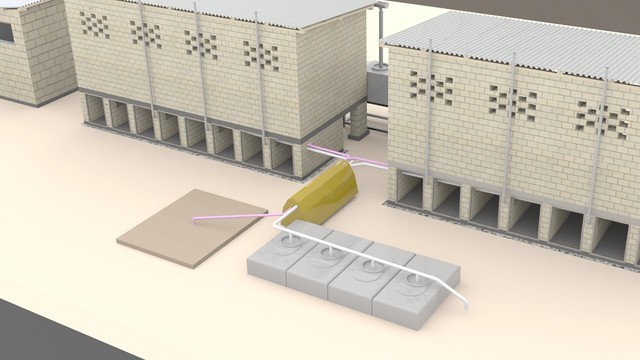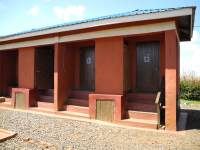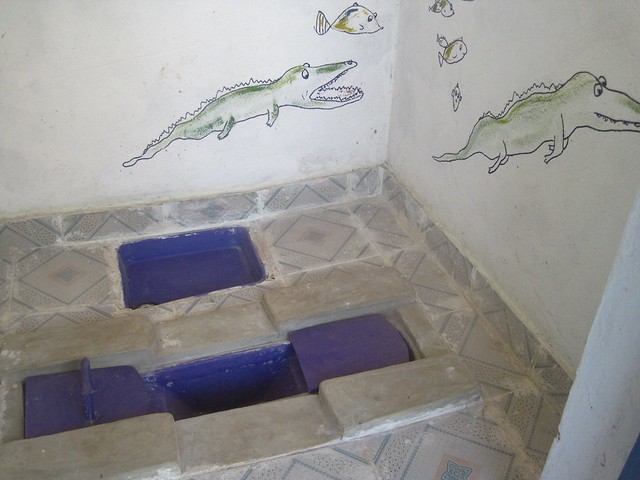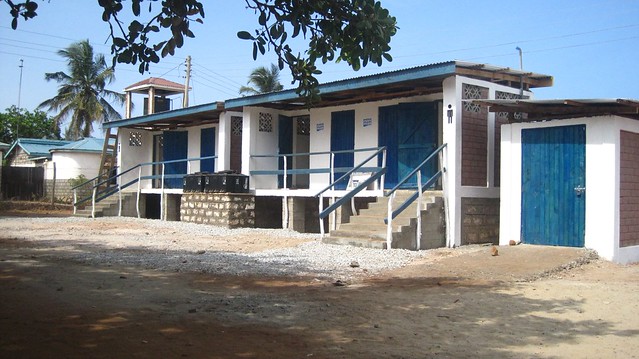- Sanitation systems
- Toilets with urine diversion
- UDDTs (urine-diverting dry toilets)
- UDDTs at schools (urine-diverting dry toilets)
- Ecological Sanitation (UDDTs and reuse) in Pastrolist Muslim community in Kenya - and Tour to Ukunda School with UDDT
Ecological Sanitation (UDDTs and reuse) in Pastrolist Muslim community in Kenya - and Tour to Ukunda School with UDDT
24.6k views
Re: Ecological Sanitation in Pastrolist Muslim community in Kenya-Tour to Ukunda School with UDDT
My apologies for the delayed response to this.
Abraham is motivated because he gets a salary and he was trained to maintain the facilities. The facilities attract quite a lot of attention and due to his knowledge, he is a very valuable resource person in the area. Yes I agree, painting the toilets in other colours apart from white would give them a better appearance. White is the colour that is normally used in many school sanitation facilities.
@Eugene, The UDDTs are accessible to children with disabilities. There is a toilet that has a seat that is designated to children with disabilities and the infrastructure has been customised to cater for children with disabilities.
Thanks and best regards,
Doreen
GIZ Sustainable Sanitation Programme
Policy Advisor in Bonn, Germany
Deutsche Gesellschaft für Internationale Zusammenarbeit (GIZ) GmbH
E This email address is being protected from spambots. You need JavaScript enabled to view it.
Please Log in to join the conversation.
You need to login to reply- dusingize
-
Less
- Posts: 5
- Karma: 1
- Likes received: 1
Re: Ecological Sanitation in Pastrolist Muslim community in Kenya
I that the UDDT are attractive, but they don't allow people living with disabilities to access them. Is there any option that those UDDT can be inclusive?
Eugene
Please Log in to join the conversation.
You need to login to reply- Elisabeth
-
- User is blocked
- Freelance consultant since 2012
Less- Posts: 3372
- Karma: 54
- Likes received: 932
Re: Ecological Sanitation in Pastrolist Muslim community in Kenya-Tour to Ukunda School with UDDT
Thanks so much for taking the time to visit this school in Ukunda and for giving us this photo story afterwards! How nice to hear about a school toilet project that didn't fail and that is thriving instead!
I suggested to Claudia that it should be included in her new case study compilation here:
forum.susana.org/forum/categories/60-wg-...world-second-edition
What do you think are the main reasons for continued good performance of these school UDDTs? I think it's probably due to Abraham, as you wrote:
There is a very eager and hardworking caretaker called Abraham who is responsible for training the new children and teaching staff on how to use the UDDTs.
What motivates Abraham to work so hard with these toilets? How is he being rewarded?
Is he perhaps rewarded by having more access to fertilisers than other farmers?
And looking at your photos, I find it interesting how "old" these toilets already look after only three years - especially the outdoor parts. I guess this is due to the harsh climate, lots of rain, always high humidity and lots of mud on people's shoes etc. Maybe painting walls in white is not so great as they look dirty quickly. Should they be painted in red or brown instead? But it seems white is always the colour of choice (same by the way for some school uniforms in India; teenage girls might appreciate more darker colours so that stains are not so easily visible...)
Regards,
Elisabeth
Freelance consultant on environmental and climate projects
Please Log in to join the conversation.
You need to login to replyRe: Ecological Sanitation in Pastrolist Muslim community in Kenya-Tour to Ukunda School with UDDT
(Please note that this is the second post; scrol up to read my previous post)
In addition to the UDDTs, there are urinals that can be accessed by the boys. As you can see, the urinals are of different heights so that they can be accessed by children of different. I am sure that the boy that uses the small urinal is usually very happy to move to the one for taller boys once he becomes taller
Additional picture of the farm.
Additional picture showing functional handwashing facilities.
The UDDT that has a sitting user interface is currently not in use because there is no child with a disability in the school. However it is still accessible.
Best regards,
Doreen
GIZ Sustainable Sanitation Programme
Policy Advisor in Bonn, Germany
Deutsche Gesellschaft für Internationale Zusammenarbeit (GIZ) GmbH
E This email address is being protected from spambots. You need JavaScript enabled to view it.
Attachments:
-
IMG_0312.JPG (Filesize: 31KB)
-
IMG_0391.JPG (Filesize: 104KB)
-
IMG_0348.JPG (Filesize: 49KB)
Please Log in to join the conversation.
You need to login to replyRe: Ecological Sanitation in Pastrolist Muslim community in Kenya-Tour to Ukunda School with UDDT
(Please note that I will make two posts. This is the first one)
I was able to visit the school in Ukunda on May 28th 2015 and I am happy to report that the toilets are still working well. For your information, this was a surprise visit as I did not have the chance to inform them that I shall be coming.
Below is some information:
All 6 doors are still be accessed by the children. The population of the children is currently at 122 students ranging from Standard 1 to 4. The means that the children accessing the toilets are between the ages of 6 and 9 years old.
The toilets are still being used very well by children. Note that their is a mixture of Christian and Muslim children in this school. Below is a picture of the UDDT that is accessed by the Muslim children. See how clean it is. There is enough ash and water for anal cleansing that is normally filled up by the caretaker.
There is a very eager and hardworking caretaker called Abraham who is responsible for training the new children and teaching staff on how to use the UDDTs. He also takes care of the vaults and urine storage. Once the vaults are full, he transports the UDDT matter to a composting pit to continue with the treatment for another month. He then takes it to the farm and uses it as soil conditioner for plants such as Kale, Capsicum, Pawpaw's and Bananas. Below is a picture of where the urine is stored. Urine is stored for 6 months and then mixed with water and used as fertilizer with a ratio of 1:1.
Below is a picture of the composting pit.
Below is a picture of the farm
More information is coming in a second post.
Thanks and best regards,
Doreen
GIZ Sustainable Sanitation Programme
Policy Advisor in Bonn, Germany
Deutsche Gesellschaft für Internationale Zusammenarbeit (GIZ) GmbH
E This email address is being protected from spambots. You need JavaScript enabled to view it.
Attachments:
-
IMG_0339.JPG (Filesize: 50KB)
-
IMG_0307_2...6-17.JPG (Filesize: 34KB)
-
IMG_0357.JPG (Filesize: 69KB)
-
IMG_0330.JPG (Filesize: 67KB)
-
IMG_0397.JPG (Filesize: 95KB)
Please Log in to join the conversation.
You need to login to reply- Elisabeth
-
- User is blocked
- Freelance consultant since 2012
Less- Posts: 3372
- Karma: 54
- Likes received: 932
Re: Ecological Sanitation in Pastrolist Muslim community in Kenya-Tour to Ukunda School with UDDT
It is now 2.5 years since the last post about these toilets (please scrol up). The toilets looked great, going by the 3D drawings and the inauguration photos. See photos above or see full set here:
www.flickr.com/photos/gtzecosan/sets/72157628950684835/
I am a little bit scared to ask this question because time and time again we have seen school toilets that were externally sponsored fall into disrepair after a short time, as soon as the donor turns his back on it and the school waits for the donor to come back... This applies equally to any type of school toilet, be it flush toilets, pit latrines or UDDTs.
But perhaps we can be happy that this project is different? Is is still going well? Has it led to any copying of the design in surrounding schools? I hope someone can give us an update. Thanks a lot.
Perhaps Engineers without Borders from Aachen, Germany, are also still involved in it and can provide an update here?
Freelance consultant on environmental and climate projects
Please Log in to join the conversation.
You need to login to reply- former member
-
Less
- Posts: 101
- Likes received: 3
Re: Ecological Sanitation in Pastrolist Muslim community in Kenya-Tour to Ukunda School with UDDT
as it happens, i'm right at the side of the toilets at the moment. I'm evaluating the procject at an intermediate stage and was also present during the visit by the Kenya Red Cross. Unfortunately I can't be seen on the pictures. But anyway, it was a great meeting. Thank you!
Currently I am preparing a report for the use of the toilet regarding maintenance, usage and benefits of it. But to answer your questions in advance:
- It takes almost three weeks to fill up the tanks and the urine and manua is used in the schoolgarden as well as in the farm next door.1) I would like to know how long it takes to fill the tanks and whether urine reuse is being practiced now at this school?
- Yes, all valves and pipes are still in good condition.2) Is all the pipe work and valves still working well?
- The school principal, head-teacher and janitor provide for the maintenance, whereby the main part is taken over by the janitor of course.3) How is the maintenance being organised (can be such a big headache with school toilets).
Cheers,
Torsten
Ingenieure ohne Grenzen e.V.
Germany
This email address is being protected from spambots. You need JavaScript enabled to view it.
++++++++
Note by moderators: This post was made by a former user with the login name Torsten who is no longer a member of this discussion forum.
Please Log in to join the conversation.
You need to login to reply- Elisabeth
-
- User is blocked
- Freelance consultant since 2012
Less- Posts: 3372
- Karma: 54
- Likes received: 932
Re: Ecological Sanitation in Pastrolist Muslim community in Kenya-Tour to Ukunda School with UDDT
Those tanks that you ask about are urine storage tanks. They are there to store the urine in order to sanitise the urine (if it has been contaminated with some faeces as a result of cross-contamination) and also to bridge gaps in fertiliser need (or in collection frequency if collected by tanker and taken to another site).
There are more photos from these toilets when they were still brand spanking new in April 2011 (including nice 3D drawings) here:
www.flickr.com/photos/gtzecosan/sets/72157628950684835/
At the time, when we saw the photos, we (Christian Rieck and myself) were wondering if these tanks were not a bit over-engineered, i.e. more complex than necessary. It is great to hear from Moses that these toilets are still being used well. I would like to know how long it takes to fill the tanks and whether urine reuse is being practiced now at this school? Is all the pipe work and valves still working well? How is the maintenance being organised (can be such a big headache with school toilets).
Cheers,
Elisabeth
One photo example as a teaser (see more by clicking on the flickr link above):

Toilet back by Sustainable sanitation , on Flickr
Freelance consultant on environmental and climate projects
Please Log in to join the conversation.
You need to login to reply- CAGIEA
-
 Less
Less- Posts: 29
- Likes received: 4
Re: Ecological Sanitation in Pastrolist Muslim community in Kenya-Tour to Ukunda School with UDDT
Thanks for the information, please can you provide us with some information on the photo 2. I would like to know what does tanks do. We do have particular interest in nutrient recovery.
Ssebabi Deo
Technical Director (CAGIEA)
www.cagiea.com
This email address is being protected from spambots. You need JavaScript enabled to view it.
Please Log in to join the conversation.
You need to login to replyRe: Ecological Sanitation in Pastrolist Muslim community in Kenya-Tour to Ukunda School with UDDT
The project at the Ukunda School that was mentioned was developed by Engineers without Borders - division Aachen, Germany. More information about it can be found at the Ecosan Network Kenya :
Engineers Without Borders in Ukunda: School sanitation with UDDTs
Update on Engineers Without Borders in Ukunda: Construction of school UDDTs completed
Best regards,
Cecília.
and the SuSanA Secretariat
Please Log in to join the conversation.
You need to login to reply- ecosanityservices
-
 Topic AuthorLess
Topic AuthorLess- Posts: 8
- Likes received: 5
Re: Ecological Sanitation (UDDTs and reuse) in Pastrolist Muslim community in Kenya - and Tour to Ukunda School with UDDT
The initial stage of community mobilization has been difficult due to religion and cultural restrictions on issues of sanitation.
The target community are basically pastrolists and are used to moving from one place to the other in search of pasture and water. Targeting schools will therefore be a better option in the project. Ecological sanitation is also challenging to impress now that the community is generally practicing open defecation as an alternative.
There are very few pit latrines in the area if any.
The same community does not practice agriculture and they wonder why someone has to recycle human urine and fecal matter for agriculture yet even the decomposed cow-dung in their home lie like huge mountains that are never used. There is also a funny belief that the 'Morans' never go to toilets and therefore they don't need these facilities.
The stakeholders awareness campaign i did in the region after being requested by Red Cross project management yielded good fruits. They were convinced that ecological sanitation is possible especially looking at the waste treatment side and convenience. The project also suggest to start some small form of agriculture within the schools so as to reuse these ecosan products.
The stakeholders were taken all along from Isiolo to Mombasa to see such a toilet in use in a Muslim school set up. Most people were wondering why they should be taken that far for the tour but they were later convinced when we arrived at Ukunda in South Coast. The anal cleansing with water was given special attention during the visit at the school. They were amazed at how the teacher was handling the decomposed solid waste with bare hands. The Public Health Officers within the visiting stakeholders wanted to see the quality analysis done for the byproducts to ensure that the products are safe for handling by human beings. This analysis report was not done by the implementing team of engineers but the school director promised to do this soon.
The team left for Isiolo a 14 hours journey by road ready to roll down the project in schools.
If you have any advice and comment, you are welcome.
This information has been given freely by:
Wakala Moses -Ecosan Expert Kenya
Tel: +254721743171. Email: This email address is being protected from spambots. You need JavaScript enabled to view it.
Attachments:
-
DSC01203.JPG (Filesize: 53KB)
-
DSC01181.JPG (Filesize: 55KB)
Please Log in to join the conversation.
You need to login to replyI hope you are well. Please visit Ukunda and see how things are working at the school. As discussed with you last week, this is a school that has successfully implemented UDDTs with Muslim and Christian children.
Just to give a bit more background information, Moses is also researching on successful implementation, operation & maintenance of UDDTs in Muslim schools. UDDTs will be implemented in schools in Isiolo and most of the children there come from Muslim families.
This is how the current situation looks like in a school in Isiolo.
They desperately need hygienic sanitation facilities in schools there.
UDDTs are working very well in a school in Ukunda. The facilities were constructed by engineers without borders from Germany. They have a UDDT for the Muslim children that has a section for anal cleansing.

IMG_7706 by Sustainable sanitation , on Flickr
and one more...

Verwenden by Sustainable sanitation , on Flickr
The students and teachers were actively involved in the construction and the toilets are maintained by school employees.
It is also worth mentioning that after the stakeholder meetings in Isiolo with Moses, the teachers and ministry officials were convinced that UDDTs is the way to go in their schools.
Emphasis now should be on training and sensitisation to ensure sustainable operation and maintenance after the construction of the facilities is completed.
Best regards,
Doreen
GIZ Sustainable Sanitation Programme
Policy Advisor in Bonn, Germany
Deutsche Gesellschaft für Internationale Zusammenarbeit (GIZ) GmbH
E This email address is being protected from spambots. You need JavaScript enabled to view it.
Attachments:
-
SAM_3464.JPG (Filesize: 40KB)
-
SAM_3457.JPG (Filesize: 38KB)
-
SAM_3483.JPG (Filesize: 36KB)
Please Log in to join the conversation.
You need to login to reply- Sanitation systems
- Toilets with urine diversion
- UDDTs (urine-diverting dry toilets)
- UDDTs at schools (urine-diverting dry toilets)
- Ecological Sanitation (UDDTs and reuse) in Pastrolist Muslim community in Kenya - and Tour to Ukunda School with UDDT








